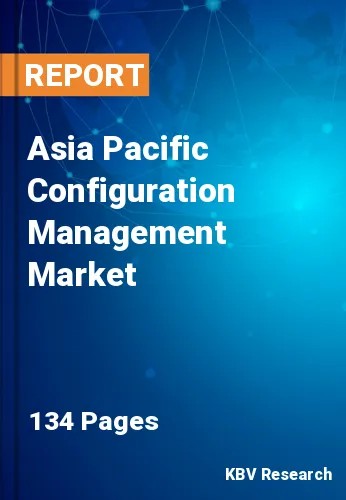Chapter 1. Market Scope & Methodology
1.1 Market Definition
1.2 Objectives
1.3 Market Scope
1.4 Segmentation
1.4.1 Asia Pacific Configuration Management Market, by Enterprise Type
1.4.2 Asia Pacific Configuration Management Market, by Asset
1.4.3 Asia Pacific Configuration Management Market, by Industry
1.4.4 Asia Pacific Configuration Management Market, by Country
1.5 Methodology for the research
Chapter 2. Market at a Glance
2.1 Key Highlights
Chapter 3. Market Overview
3.1 Introduction
3.1.1 Overview
3.1.1.1 Market Composition and Scenario
3.2 Key Factors Impacting the Market
3.2.1 Market Drivers
3.2.2 Market Restraints
3.2.3 Market Opportunities
3.2.4 Market Challenges
Chapter 4. Competition Analysis - Global
4.1 KBV Cardinal Matrix
4.2 Recent Industry Wide Strategic Developments
4.2.1 Partnerships, Collaborations and Agreements
4.2.2 Product Launches and Product Expansions
4.2.3 Acquisition and Mergers
4.3 Market Share Analysis, 2023
4.4 Top Winning Strategies
4.4.1 Key Leading Strategies: Percentage Distribution (2020-2024)
4.4.2 Key Strategic Move: (Partnerships, Collaborations & Agreements: 2020, Sep – 2024, Jul) Leading Players
4.5 Porter Five Forces Analysis
Chapter 5. Asia Pacific Configuration Management Market by Enterprise Type
5.1 Asia Pacific Large Enterprises Market by Country
5.2 Asia Pacific SMEs Market by Country
Chapter 6. Asia Pacific Configuration Management Market by Asset
6.1 Asia Pacific Server Infrastructure Market by Country
6.2 Asia Pacific Cloud Resources Market by Country
6.3 Asia Pacific Network Devices Market by Country
6.4 Asia Pacific Security Devices Market by Country
6.5 Asia Pacific Edge Infrastructure Market by Country
Chapter 7. Asia Pacific Configuration Management Market by Industry
7.1 Asia Pacific IT & Telecom Market by Country
7.2 Asia Pacific Healthcare Market by Country
7.3 Asia Pacific Manufacturing Market by Country
7.4 Asia Pacific BFSI Market by Country
7.5 Asia Pacific Retail Market by Country
7.6 Asia Pacific Other Industry Market by Country
Chapter 8. Asia Pacific Configuration Management Market by Country
8.1 China Configuration Management Market
8.1.1 China Configuration Management Market by Enterprise Type
8.1.2 China Configuration Management Market by Asset
8.1.3 China Configuration Management Market by Industry
8.2 Japan Configuration Management Market
8.2.1 Japan Configuration Management Market by Enterprise Type
8.2.2 Japan Configuration Management Market by Asset
8.2.3 Japan Configuration Management Market by Industry
8.3 India Configuration Management Market
8.3.1 India Configuration Management Market by Enterprise Type
8.3.2 India Configuration Management Market by Asset
8.3.3 India Configuration Management Market by Industry
8.4 South Korea Configuration Management Market
8.4.1 South Korea Configuration Management Market by Enterprise Type
8.4.2 South Korea Configuration Management Market by Asset
8.4.3 South Korea Configuration Management Market by Industry
8.5 Australia Configuration Management Market
8.5.1 Australia Configuration Management Market by Enterprise Type
8.5.2 Australia Configuration Management Market by Asset
8.5.3 Australia Configuration Management Market by Industry
8.6 Malaysia Configuration Management Market
8.6.1 Malaysia Configuration Management Market by Enterprise Type
8.6.2 Malaysia Configuration Management Market by Asset
8.6.3 Malaysia Configuration Management Market by Industry
8.7 Rest of Asia Pacific Configuration Management Market
8.7.1 Rest of Asia Pacific Configuration Management Market by Enterprise Type
8.7.2 Rest of Asia Pacific Configuration Management Market by Asset
8.7.3 Rest of Asia Pacific Configuration Management Market by Industry
Chapter 9. Company Profiles
9.1 CloudBees, Inc.
9.1.1 Company Overview
9.1.2 Recent strategies and developments:
9.1.2.1 Acquisition and Mergers:
9.2 Puppet, Inc. (Perforce Software, Inc.)
9.2.1 Company Overview
9.3 VMware, Inc. (Broadcom Inc.)
9.3.1 Company Overview
9.3.2 Financial Analysis
9.3.3 Segmental and Regional Analysis
9.3.4 Research & Development Expense
9.3.5 Recent strategies and developments:
9.3.5.1 Partnerships, Collaborations, and Agreements:
9.3.5.2 Acquisition and Mergers:
9.3.6 SWOT Analysis
9.4 Cisco Systems, Inc.
9.4.1 Company Overview
9.4.2 Financial Analysis
9.4.3 Regional Analysis
9.4.4 Research & Development Expense
9.4.5 Recent strategies and developments:
9.4.5.1 Partnerships, Collaborations, and Agreements:
9.4.5.2 Product Launches and Product Expansions:
9.4.6 SWOT Analysis
9.5 Atlassian Corporation PLC
9.5.1 Company Overview
9.5.2 Financial Analysis
9.5.3 Regional Analysis
9.5.4 Research & Development Expenses
9.5.5 Recent strategies and developments:
9.5.5.1 Product Launches and Product Expansions:
9.5.5.2 Acquisition and Mergers:
9.5.6 SWOT Analysis
9.6 Microsoft Corporation
9.6.1 Company Overview
9.6.2 Financial Analysis
9.6.3 Segmental and Regional Analysis
9.6.4 Research & Development Expenses
9.6.5 Recent strategies and developments:
9.6.5.1 Partnerships, Collaborations, and Agreements:
9.6.6 SWOT Analysis
9.7 Amazon Web Services, Inc. (Amazon.com, Inc.)
9.7.1 Company Overview
9.7.2 Financial Analysis
9.7.3 Segmental Analysis
9.7.4 Recent strategies and developments:
9.7.4.1 Partnerships, Collaborations, and Agreements:
9.7.5 SWOT Analysis
9.8 ServiceNow, Inc.
9.8.1 Company Overview
9.8.2 Financial Analysis
9.8.3 Regional Analysis
9.8.4 Research & Development Expenses
9.8.5 Recent strategies and developments:
9.8.5.1 Partnerships, Collaborations, and Agreements:
9.8.5.2 Acquisition and Mergers:
9.9 Oracle Corporation
9.9.1 Company Overview
9.9.2 Financial Analysis
9.9.3 Segmental and Regional Analysis
9.9.4 Research & Development Expense
9.9.5 Recent strategies and developments:
9.9.5.1 Partnerships, Collaborations, and Agreements:
9.9.5.2 Product Launches and Product Expansions:
9.9.6 SWOT Analysis
9.10. NetApp, Inc.
9.10.1 Company Overview
9.10.2 Financial Analysis
9.10.3 Segmental Analysis
9.10.4 Research & Development Expenses
9.10.5 Recent strategies and developments:
9.10.5.1 Partnerships, Collaborations, and Agreements:
9.10.6 SWOT Analysis

